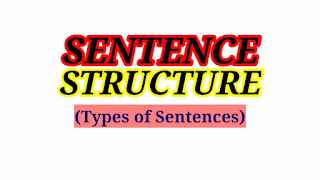Pronoun
PARTS OF SPEECH
There are nine Parts of speech. They are:
1. NOUN
2. PRONOUN
3. ADJECTIVE
4. VERB
5. ADVERB
6. PREPOSITION
7. CONJUNCTION
8. INTERJECTION
9. ARTICLE
In this post we discuss only about pronoun.
PRONOUN:
pronoun is define as; 'a word which is used in place of a noun'. We have to use pronouns to avoid the repetition of nouns.
Read the following sentences:
Quaid-e-Azam is the founder of Pakistan. Quaid-e-Azam devoted his life for its creation. Quaid-e-Azam's contribution to its independence is unforgettable.
In these sentences the repetition of `Quaid-e-Azam' does not look nice. We, therefore, replace it with pronoun as:
Quaid-e-Azan is the founder of Pakistan. He devoted his life for it's creation. His contribution to independence is unforgettable.
While replacing the other words, pronouns carry the meaning of these replaced words.
Kinds of Pronouns:
1. Personal Pronouns
2. Reflexive Pronouns
3. Emphatic Pronoun
4. Relative Pronouns
5. Interrogative Pronouns
6. Demonstrative Pronouns
7. Indefinite Pronouns
1-PERSONAL PRONOUNS:
I, We, You, He, She, They, lt, are called Personal Pronouns because they refer to the three persons:
(i) First person (the person speaking or writing)
(ii) Second person the person addressed)
(iii) Third person (the person spoken about)
FORMS / CASES OF PERSONAL PRONOUNS
(i)-Uses of personal pronouns:
The pronoun forms I, We, he, she, it, they, who, whoever, are in the nominative/subjective case. The nominative/subjective case is used:
(a) to express a subject, as:
Jameel and I are going to Swat.
I don't know who made a noise. (who is the subject of made).
Tell it to whoever asks. (whoever is the subject of 'asks')
(b) to express the subject when the verb is omitted, as:
She is more diligent than he. (The verb 'is' has been omitted).
I read as well as he. (The verb 'read' has been omitted)
(ii) The Objective Case:
The pronoun forms me, us, him, her, them, whom, whomever are in the objective case. The pronouns you and it have the same from in the nominative/subjective case. The objective case is used:
(a) to express the object of a verb, verbal, or preposition, as:
Holding him by the collar, the policemen dragged him into the room (`him is the object of the verb holding and dragged).
Whom was she talking about? ['whom' is the object of the preposition about'].
(b) to express the object when the verb is omitted, as:
The principal did not mention him as highly as me.
(iii) The Possessive Case:
There are two forms of possessive cases:
(a) my, our, your, her, his, its, their
(b) mine, ours, yours, hers, his, its, theirs
The first (1st) form is called possessive adjective because they are used with the nouns and do the work of adjectives, as:
This is my pen.
Those are your books.
This is her doll.
The second form of possessive case is called possessive pronouns. They are used without nouns. The possessive pronouns replace the possessive adjective, as:
This is our college. (possessive adjective) This college is ours.
This is your watch.
This watch is yours.
This is her doll.
This doll is hers.
These are their books.
These books are theirs.
Note that no apostrophe [`s] is used here.
The possessive pronouns are used to show the possessors and not the things possessed. Everything that a boy or man possesses is denoted as 'his' thing and everything that a girt or woman possesses is denoted as 'her' thing.
Use of It
The pronoun it is used.
i) for inanimate things; as:
Here is your bicycle, you may ride it.
(ii) for animals; when sex is not expressed.
He has a cow and he milks it daily.
iii) for young children when sex is not expressed: as:
The baby was feeling cold when I took it.
The child has lost its toy.
(iv) as an indefinite nominative of an impersonal verb; as:
it is raining.
it is snowing on the hills.
(v) as a introductory or provisional subject before a verb when a real subject follows It as:
It is easy to find faults.
It is too hot to move out.
(iv) as a provisional object; as:
I thought it wise to avoid clash.
(vii) to emphasize some noun or pronoun; as:
It is my friend who deceived me.
It is he who betrayed me.
2-REFLEXIVE PRONOUN
Reflexive pronouns denote that the doer of the action is both the subject and the object. It is so because the action done by the subject returns to the subject; as:
He harms himself.
I wash myself when I get up.
You express yourself very imperfectly
["Reflexive pronouns are formed by adding 'self' to my, your, him, her, it and 'selves' self, to our, your, them.]
3-EMPHATIC PRONOUN
Emphatic pronouns are the same such as the reflexive pronouns. Empathic pronouns, as the term denotes, are used for the sake of emphasis and stress, as:
I will do it myself.
I myself caught him red-handed.
We ourselves cooked our meal.
You yourself can control the situation.
He himself should look after his parents.
She herself gave up this idea.
4-RELATIVE PRONOUNS
The relative pronouns refer to a noun or pronoun previously mentioned and also join two clauses. They are also pronoun and conjunction at the same time. The noun or pronoun to which the whose, which, what, as, that. relative pronouns refer, is called their antecedent. The chief relative pronouns are who, which, whose, whom, what, as, that.
Read the following sentences.
I know the man who conspired against me.
The woman whose husband is dead called widow.
I know the man whom you insulted.
I have bought the pen which is defective.
He will certainly get what he wants.
Uneasy feels a head that wears the crown.
He was in the same dress as he was yesterday.
5-INTERROGATIVE PRONOUN
The interrogative pronouns what, which, who, whom, whose are used to introduce questions. Who is used in nominative Case; whose is in the possessive case; and whom is in the objective case. Who, whom and whose refer to persons only; which refers to both persons and things; and what is used of things only, as;
What is your name?
Which of the boys was hurt?
Whose is the college?
Who will bell the cat?
Whom do you like?
The interrogative pronouns are also used to ask indirect questions, as:
I asked him what his name was.
I didn't know who to made a noise
Tell me what your aim is.
6-DEMONSTRATIVE PRONOUNS
The demonstrative pronouns this, these, that, those are used to point out the things to which they refer. They also indicate nearness or distance from the speaker. 'This' refers to what is near to the speaker and 'that refers to what is away from the speaker. These and those are plural of this and that respectively. as:
This is my book.
That is yours.
These are our goods.
Those are yours.
This is also used to avoid the repetition of a preceding noun, as:
The climate of Murree is better than that of Karachi.
His salary is higher than that of his younger brother.
7-DISTRIBUTIVE PRONOUNS
The distributive pronouns each, either, neither refer to each member of a class or group. They are always singular and take a singular verb, as:
Each of the four students has passed the examination.
Is either of your parents at home?
Either of these two men is to blame.
Neither of these two friends is sincere.
Each refers to every one of persons or things taken singly. Either means 'any one of two' and neither means 'no one and not other of two'. Neither is the negative of either.
8-INDEFINITE PRONOUNS
The indefinite pronouns are those which refer to persons or things in a general way but do not refer to any particular person or thing; as:
One should do one's duty honestly.
One must not injure others' feelings.
Nobody was willing to favour him.
Some believe that he is innocent.
Somebody has spread this rumour.
Many of them were saved.
I don't see any of them again.
All were rescued.
Everybody was in a hurry.
One of them will see you.
Few believe in sincere friendship.
None of his sons served him.
We did not ask anybody to reach the station.
EXERCISE NO:1
Point out the kinds of pronoun of the underlined words in the following sentences:
1. Allama iqbal is our national poet.
2. This is a great secret between you and me.
3. Here is your motor-cycle; drive it carefully.
4. Somebody knocked at the door.
5. None of the students passed the examination.
6. This is the boy who pilfered my pen.
7. This is the place where I met him last time.
8. He can play hockey better than you.
9. The climate of Multan is hotter than that of Karachi.
10. She bought a new pen but lost it.
11. Don't injure others' feelings.
12. Either you or your brother has hurt him.
13. Neither he nor his friend was there.
14. One of the students was punished.
15. Nobody was ready to sacrifice.
16. I have found the book which you mentioned.
17. He himself lost his honour.
18. The prince was sitting by himself in the garden.
19. The horse hurt itself.
20. You he and I visited the flower exhibition
21. This book is mine and that is yours.
22. Each of the boys got a prize.
23. One should, respect one's elders.
24. All that I said fell flat on him.
25. I asked him where he lived.
EXERCISE NO. 2
Choose correct pronoun from those given in brackets and fill in the blank:
1. He devoted __________ to the service of mankind. (him, himself)
2. I waited for _______ . (him, his)
3. America deployed _______ army on the border. (its, his)
4. She washed _______ clothes. (his, her)
5. One should do ______ duty. (his, one's)
6. This pen is . (my, mine)
7. He speaks English better than ______. (she, her)
8. The man was my uncle _______ you saw yesterday. (who, whom)
9. I do believe ______ you say. (that, what)
10. I _______ invited him to dinner. (myself, himself)
11. These books are mine but those are _______ (your, yours)
12. The baby ______ broke the toy. (himself, itself)
13. Most people do not get _____ they desire. (what, that)
14. 1 saw the horse _____ won the race. (which, that)
15. This is the book ______ I asked for. (that, what)
Have a nice day.







Comments
Post a Comment